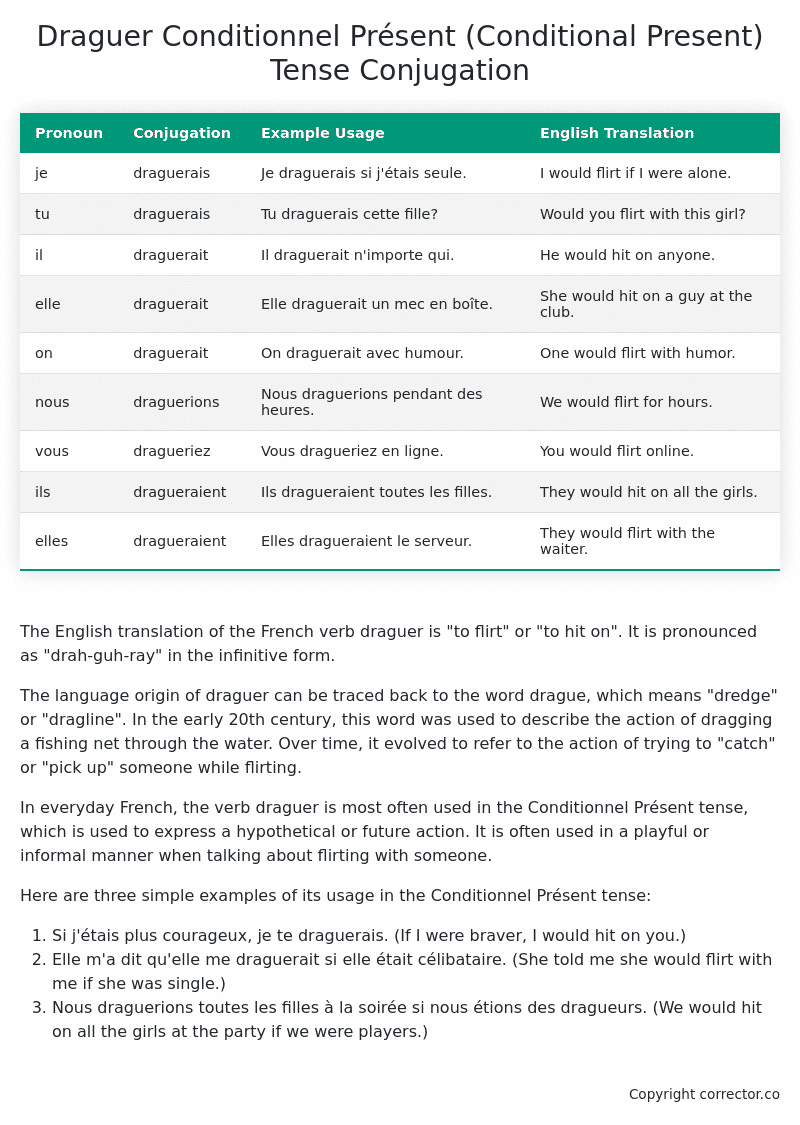Conditionnel Présent (Conditional Present) Tense Conjugation of the French Verb draguer
Introduction to the verb draguer
The English translation of the French verb draguer is “to flirt” or “to hit on”. It is pronounced as “drah-guh-ray” in the infinitive form.
The language origin of draguer can be traced back to the word drague, which means “dredge” or “dragline”. In the early 20th century, this word was used to describe the action of dragging a fishing net through the water. Over time, it evolved to refer to the action of trying to “catch” or “pick up” someone while flirting.
In everyday French, the verb draguer is most often used in the Conditionnel Présent tense, which is used to express a hypothetical or future action. It is often used in a playful or informal manner when talking about flirting with someone.
Here are three simple examples of its usage in the Conditionnel Présent tense:
- Si j’étais plus courageux, je te draguerais. (If I were braver, I would hit on you.)
- Elle m’a dit qu’elle me draguerait si elle était célibataire. (She told me she would flirt with me if she was single.)
- Nous draguerions toutes les filles à la soirée si nous étions des dragueurs. (We would hit on all the girls at the party if we were players.)
Table of the Conditionnel Présent (Conditional Present) Tense Conjugation of draguer
| Pronoun | Conjugation | Example Usage | English Translation |
|---|---|---|---|
| je | draguerais | Je draguerais si j’étais seule. | I would flirt if I were alone. |
| tu | draguerais | Tu draguerais cette fille? | Would you flirt with this girl? |
| il | draguerait | Il draguerait n’importe qui. | He would hit on anyone. |
| elle | draguerait | Elle draguerait un mec en boîte. | She would hit on a guy at the club. |
| on | draguerait | On draguerait avec humour. | One would flirt with humor. |
| nous | draguerions | Nous draguerions pendant des heures. | We would flirt for hours. |
| vous | dragueriez | Vous dragueriez en ligne. | You would flirt online. |
| ils | dragueraient | Ils dragueraient toutes les filles. | They would hit on all the girls. |
| elles | dragueraient | Elles dragueraient le serveur. | They would flirt with the waiter. |
Other Conjugations for Draguer.
Le Present (Present Tense) Conjugation of the French Verb draguer
Imparfait (Imperfect) Tense Conjugation of the French Verb draguer
Passé Simple (Simple Past) Tense Conjugation of the French Verb draguer
Passé Composé (Present Perfect) Tense Conjugation of the French Verb draguer
Futur Simple (Simple Future) Tense Conjugation of the French Verb draguer
Futur Proche (Near Future) Tense Conjugation of the French Verb draguer
Plus-que-parfait (Pluperfect) Tense Conjugation of the French Verb draguer
Passé Antérieur (Past Anterior) Tense Conjugation of the French Verb draguer
Futur Antérieur (Future Anterior) Tense Conjugation of the French Verb draguer
Subjonctif Présent (Subjunctive Present) Tense Conjugation of the French Verb draguer
Subjonctif Passé (Subjunctive Past) Tense Conjugation of the French Verb draguer
Subjonctif Imparfait (Subjunctive Imperfect) Tense Conjugation of the French Verb draguer
Subjonctif Plus-que-parfait (Subjunctive Pluperfect) Tense Conjugation of the French Verb draguer
Conditionnel Présent (Conditional Present) Tense Conjugation of the French Verb draguer (this article)
Conditionnel Passé (Conditional Past) Tense Conjugation of the French Verb draguer
L’impératif Présent (Imperative Present) Tense Conjugation of the French Verb draguer
L’infinitif Présent (Infinitive Present) Tense Conjugation of the French Verb draguer
Struggling with French verbs or the language in general? Why not use our free French Grammar Checker – no registration required!
Get a FREE Download Study Sheet of this Conjugation 🔥
Simply right click the image below, click “save image” and get your free reference for the draguer Conditionnel Présent tense conjugation!

Draguer – About the French Conditionnel Présent (Conditional Present) Tense
Formation
Common Everyday Usage Patterns
Expressing Polite Requests
Expressing Hypothetical Situations
Expressing Doubt or Uncertainty
Interactions with Other Tenses
Present Tense
Past Tense
Future Tense
Conditional Perfect
Summary
Want More?
I hope you enjoyed this article on the verb draguer. Still in a learning mood? Check out another TOTALLY random French verb conjugation!


